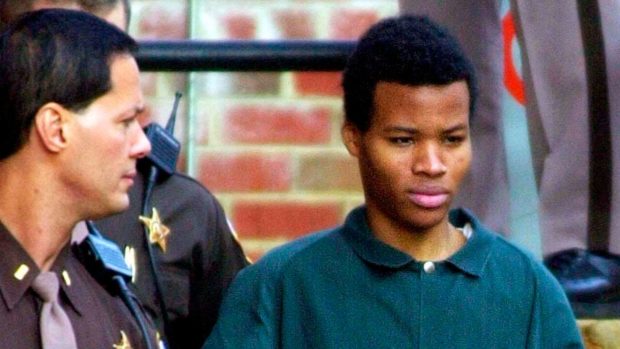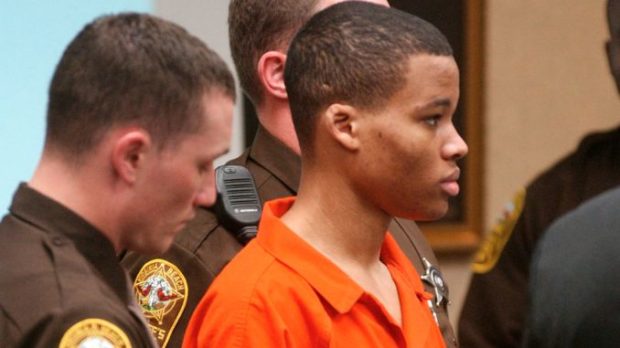Supreme Court to Hear Sentencing Case for the ‘Washington Sniper’
Lee Boyd Malvo was sentenced to life without parole after he confessed that in 2002 he and an accomplice terrorized the Washington area in a three-week random shooting spree that left 10 people dead.
But he was only 17 at the time of the shooting, and the Supreme Court heard arguments Wednesday on whether such an unbending sentence was appropriate and constitutional for a minor.
DC Sniper's Life Sentences Weighed By US Supreme Court https://t.co/9wmZjjoueq pic.twitter.com/8jcUuVxEVU
— Washington DC Patch (@DC_Patch) October 17, 2019
Many in the US capital — and presumably many of the justices themselves — still recall the terror spread by Malvo and 41-year-old John Allen Muhammad, a father figure who was executed in 2009 for the murder spree.
But his appeal for a review — based on the Supreme Court’s 2012 and 2016 rulings against mandatory life without parole sentences for juveniles – evoked questions of the US Constitution’s ban on excessive and overly cruel punishments and whether a person guilty of a horrific series of murders, but only a teen at the time, should be judged incorrigible.
Jamaica-born Malvo described himself as a “monster” after his arrest and confession.
Courts in Virginia in 2004 and Maryland in 2006 gave Malvo a total of 10 sentences of life in prison without parole, without weighing any lighter sentences.
But his supporters say that the Supreme Court’s subsequent rulings against mandatory life for juveniles should overrule the two-state sentences.
One of those two rulings, known as Miller v. Alabama, “makes very clear that sentencers must actually consider the characteristics of youth and determine whether life without parole is a proportional sentence,” said Malvo’s lawyer Danielle Spinelli.
“If he can demonstrate, as a result of good behavior in prison, for example, that he has been rehabilitated, then he must be released?” asked Justice Samuel Alito in the hearing Wednesday.
Spinelli answered no, it was not mandatory.
However, she noted, “He is entitled to have one opportunity to make the case that he is not permanently incorrigible.”
– Court ‘must consider youth’ –
The Miller judgment “is that youth matters and that you have to consider youth in making these sorts of sentencing determinations,” said Justice Elena Kagan.
The case stirred emotions across the Washington region.
The Virginia prosecutor who helped convict Malvo, Ray Morrogh, told WTOP radio he hoped the court would not rule in Malvo’s favor.
“Malvo is a serial killer — this is a very evil, evil person, who should never be released,” he said.
“I, for one, don’t want to run into Malvo in the supermarket someday.”
Arguments before the court suggested a decision could hinge on the application of the two previous rulings on mandatory sentencing to Virginia state laws and procedures.
Spinelli pointed out that the Miller ruling has already led to more than 2,000 resentencing, but that Virginia has 13 people serving life without parole for murders committed as minors.
“In none of those cases was there any meaningful consideration of a lower sentence, let alone consideration of whether youth made life without parole unconstitutional,” she said.
– ‘Prison with no hope’ –
Malvo’s lawyers acknowledge that whatever the nine-member Supreme Court rules, he is unlikely to be freed anytime soon.
Nevertheless, the court hearing has resurfaced strong emotions surrounding the case.
The Trump administration has argued that the court should not provide an “escape hatch” that would allow Malvo to avoid stiff punishment for his “heinous crimes.”
In a brief, the Maryland Crime Victims’ Resource Center said “liberty and justice for all do not allow the consideration of only the interests of criminal defendants.
“They demand that victims’ interests be fully considered.”
Related Articles
At least one of Malvo’s victims, Paul LaRuffa, who was shot five times, supports revisiting his sentencing.
“After my experience, I was of the opinion that the life without parole sentence for Malvo was absolutely justified using the argument that, at 17 years old, he knew the difference between right and wrong,” LaRuffa told AFP.
“Since that time, I have learned more about juvenile brain development, psychological development, as well as many successful juvenile rehabilitation stories.
“I feel that there is a better answer in our justice system than dooming juveniles to a life of 40, 50 or 60 plus years in prison with no hope.”



